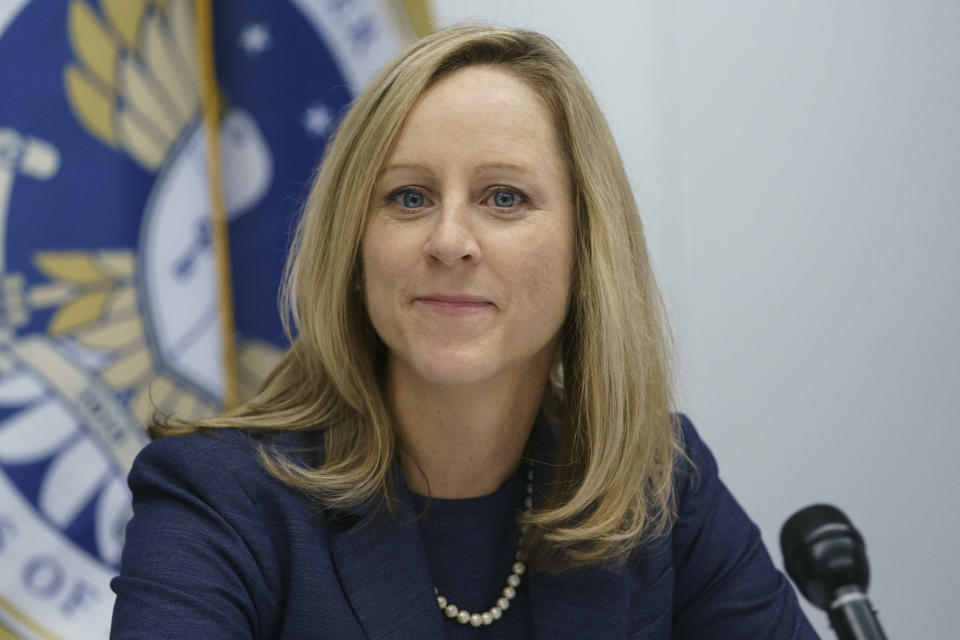New head of watchdog agency vows consumers will be top focus
New head of Consumer Financial Protection Bureau promises to put consumers first

New Bureau of Consumer Financial Protection director Kathy Kraninger pauses as she speaks to media at the Bureau of Consumer Financial Protection offices in Washington, Tuesday, Dec. 11, 2018. (AP Photo/Carolyn Kaster)
WASHINGTON (AP) -- The new head of the U.S. consumer watchdog agency says she doesn't have immediate targets in mind for rolling back actions taken by her controversial predecessor, and will put protecting consumers in the forefront while also encouraging financial innovation.
Kathy Kraninger, nominated by President Donald Trump and confirmed by the Senate last week on a narrow, party-line vote, has replaced Mick Mulvaney as director of the Consumer Financial Protection Bureau.
Mulvaney, named by Trump as acting director a year ago, had been a vocal critic of the agency and made deep changes to it. He proposed cutting back many of the CFPB's rules put in place during the Obama administration and scaled back its enforcement efforts.
"We absolutely will put consumers first in the decisions that I will make," Kraninger said Tuesday in her first meeting with reporters.
A leading priority will be the security and privacy of data, what the agency collects from consumers and what it stores, she said.
Extensive review and consultation will come before those decisions are made, Kraninger said. "I want to understand why and how something was done before."
Many observers expect Kraninger to run the agency in a similar industry-friendly way to Mulvaney's.
Kraninger is taking up a five-year term as CFPB director. She worked as a mid-level official in the White House's budget office, most recently under Mulvaney, who remains its head. Kraninger has no experience in financial services and had never run a federal agency before — prompting Democratic lawmakers to oppose her nomination.
Mulvaney's actions spurred the departure of many high-level staff members at the agency, including deputy director Leandra English and Seth Frotman, who was the top official overseeing student loan issues. Mulvaney hired several Republican political operatives to oversee nearly all parts of the agency's operations.
In her meeting with reporters, Kraninger said there are "appropriate roles" for both career staff and political appointees at the CFPB.
She didn't reject outright Mulvaney's view that the CFPB under Obama appointee Richard Cordray had overreached in its enforcement actions against companies selling financial products and services.
The CFPB was created as in independent agency by the landmark Dodd-Frank law that overhauled the regulations governing Wall Street and banks around the country in the wake of the 2008-09 financial crisis. Its director was given broad latitude to act alone, without winning agreement from members of an agency board.
While it enforces consumer-protection laws, the CFPB also gained powers to scrutinize the practices of virtually any business selling financial products and services: credit card companies, payday lenders, mortgage servicers, debt collectors, for-profit colleges, auto lenders, money-transfer agents. Under Cordray, the agency undertook enforcement actions against an array of companies large and small, and claimed that it returned tens of billions of dollars to consumers harmed by illegal practices.
With the Democrats having won control of the U.S. House as a result of the midterm elections, oversight of the CFPB under Kraninger will surely intensify. Rep. Maxine Waters, the California Democrat who will head the House Financial Services Committee, has been sharply critical of Mulvaney's tenure.
Consumer groups have kept up their opposition. "Kraninger needs to take concrete steps toward getting the agency back to its true mission: protecting consumers and the public interest," Lisa Donner, executive director of Americans for Financial Reform, said in a statement. "Kraninger needs to change course and return to the job of standing up for people ripped off by Wall Street and predatory lenders."

